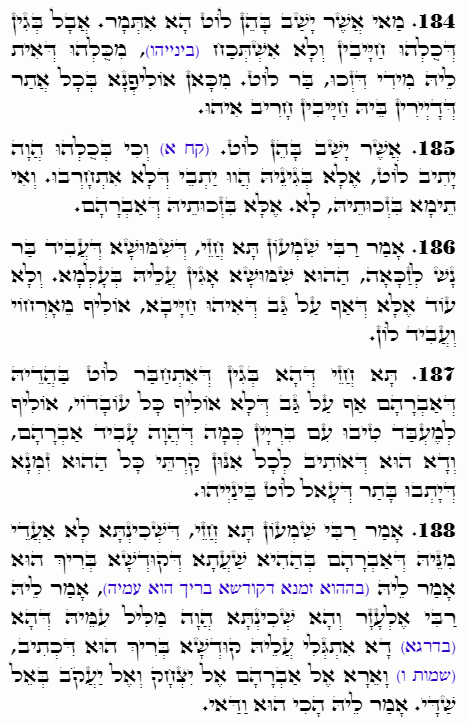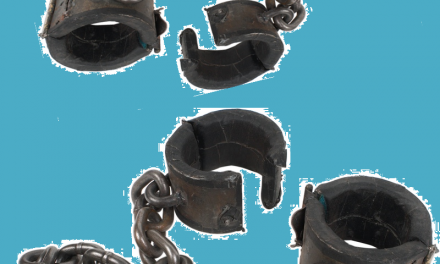Daily Zohar # 4703 – Vayera – I appeared to Abraham
Daily Zohar 4703

Hebrew translation:
185. אֲשֶׁר יָשַׁב בָּהֵן לוֹט, וְכִי בְּכֻלָּם יָשַׁב לוֹט? אֶלָּא בִּגְלָלוֹ הָיוּ מְיֻשָּׁבִים וְלֹא חָרְבוּ. וְאִם תֹּאמַר בִּזְכוּתוֹ – לֹא! אֶלָּא בִּזְכוּת אַבְרָהָם.
186. אָמַר רַבִּי שִׁמְעוֹן, בֹּא רְאֵה שֶׁשִּׁמּוּשׁ שֶׁאָדָם עוֹשֶׂה לְצַדִּיק, אוֹתוֹ שִׁמּוּשׁ מֵגֵן עָלָיו בָּעוֹלָם, וְלֹא עוֹד, אֶלָּא שֶׁאַף עַל גַּב שֶׁהוּא רָשָׁע, לוֹמֵד מִדְּרָכָיו וְעוֹשֶׂה אוֹתָם.
187. בֹּא רְאֵה, שֶׁהֲרֵי מִשּׁוּם שֶׁהִתְחַבֵּר לוֹט עִם אַבְרָהָם – אַף עַל גַּב שֶׁלֹּא לָמַד כָּל מַעֲשָׂיו, לָמַד לַעֲשׂוֹת חֶסֶד עִם הַבְּרִיּוֹת כְּמוֹ שֶׁהָיָה עוֹשֶׂה אַבְרָהָם, וְזֶהוּ שֶׁהָיָה מְיַשֵּׁב אֶת כָּל אוֹתָן הֶעָרִים כָּל אוֹתוֹ זְמַן שֶׁהָיוּ מְיֻשָּׁבִים אַחַר שֶׁנִּכְנַס לוֹט בֵּינֵיהֶם.
188. אָמַר רַבִּי שִׁמְעוֹן, בֹּא רְאֵה שֶׁשְּׁכִינָה לֹא זָזָה מֵאַבְרָהָם בְּאוֹתָהּ שָׁעָה שֶׁהַקָּדוֹשׁ בָּרוּךְ הוּא אָמַר לוֹ [בְּאוֹתוֹ זְמַן שֶׁהַקָּדוֹשׁ בָּרוּךְ הוּא עִמּוֹ]. אָמַר לוֹ רַבִּי אֶלְעָזָר, וַהֲרֵי שְׁכִינָה הָיְתָה מְדַבֶּרֶת עִמּוֹ, שֶׁהֲרֵי [בְּדַרְגָּה] זוֹ הִתְגַּלָּה אֵלָיו הַקָּדוֹשׁ בָּרוּךְ הוּא, שֶׁכָּתוּב (שמות ו) וָאֵרָא אֶל אַבְרָהָם אֶל יִצְחָק וְאֶל יַעֲקֹב בְּאֵל שַׁדָּי. אָמַר לוֹ, כָּךְ זֶה וַדַּאי.
.
Zohar Vayera
Continued from previous DZ
#184
What does it mean, “where Lot dwelled”? Why were these places named after him? This has been explained, but it is because all the inhabitants were wicked, and there was no one among them with any merit except for Lot. From this, we learn that any place where wicked people dwell is considered desolate. The verse that says, “where Lot dwelled,” implies that due to the presence of the others who lived there, it was not regarded as a settled area but rather as desolate and empty because they were wicked.
#185
And he asks, “Was Lot dwelling in all the cities?” The answer is given: It was because of him that they (the cities) continued to be inhabited and were not destroyed, so they were named after him. But if you say that it was due to Lot’s merit, that is not so; instead, it was due to the merit of Abraham.
#186
Rabbi Shimon said, “Come and see: The service that a person performs for a Tzadik protects them in this world. Not only that, but even if the person is wicked, they can learn from Tzadikim’s ways and follow them.
#187
Come and see: Because Lot was associated with Abraham, even though he did not learn all of Abraham’s ways, he did learn from him to do good to others, as Abraham did. This is why, after Lot joined them, he brought stability to all these cities during the time they were inhabited. Therefore, it is written, “where Lot dwelled” (Genesis 19:29).
#188
Rabbi Shimon said, “Come and see, the Shechinah never departed from Abraham. At that time, the Holy One, Blessed be He, was with him.” Rabbi Elazar said to him, “But wasn’t the Shechinah itself speaking with him, not merely Hashem alone? For in this level, the Holy One, Blessed be He appeared to him, as it is written, “וָאֵרָא אֶל אַבְרָהָם אֶל יִצְחָק וְאֶל יַעֲקֹב בְּאֵל שַׁדָּי” ‘I appeared to Abraham… as El Shaddai’ (Exodus 6:3), which is the Shechinah. So what does it mean to tell us that the Shechinah did not depart from Abraham when Hashem was with him?” Rabbi Shimon answered, “Indeed, this is true, and you are correct.”
Notes:
Rabbi Shimon states that the Shechinah, never left Abraham, while Rabbi Elazar clarifies that this was not merely a general divine presence, but specifically the Shechinah in the aspect of El Shaddai. This suggests a unique, constant relationship between Abraham and the Divine, where the Shechinah was actively engaged with him.
{||}

 Previous: Vayera
Previous: Vayera


